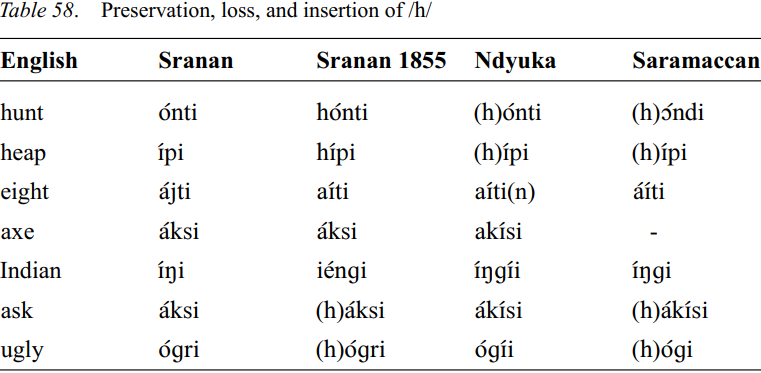
Preservation, loss, and insertion of /h/
 المؤلف:
Norval Smith and Vinije Haabo
المؤلف:
Norval Smith and Vinije Haabo
 المصدر:
A Handbook Of Varieties Of English Phonology
المصدر:
A Handbook Of Varieties Of English Phonology
 الجزء والصفحة:
556-31
الجزء والصفحة:
556-31
 2024-04-16
2024-04-16
 1171
1171
Preservation, loss, and insertion of /h/
In modern Sranan [h] at the beginning of words is a mark of emphasis. However up till the 19th century /h/ was a phoneme of Sranan. It also occurs optionally in Ndyuka and Saramaccan at the present. There is a set of words in the Suriname creoles that may begin (or in the case of Sranan, began) with /h/, and another set that always begins with a vowel. These do not however agree with the corresponding sets in English

The answer to the question how this state of affairs could come about must lie in the presence of a mixture of /h/-less and /h/-full dialects. Cockney, for example, is like most Southern and Midland dialects in not having initial /h/. However, Cockney is famous for optionally inserting an [h] before vowel-initial words.
The statistical connection between /h/-initial words in Standard English and those in the Suriname creoles must be explained by a basic Standard English heritage. On the other hand, the occurrence of /h/ in non-/h/-inital words must reflect the influence of a Cockney-like dialect. There are no /h/-words in Standard English that lack an /h/ completely in all Suriname creoles, a fact which argues for a greater degree of standard than sub-standard influence.
 الاكثر قراءة في Phonology
الاكثر قراءة في Phonology
 اخر الاخبار
اخر الاخبار
اخبار العتبة العباسية المقدسة


